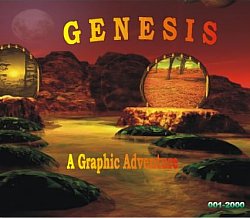| The story Quite a good story actually, which is developing during the game and
culminates in the alien’s test. The story is to a large extent logical,
although the part, where you are confronted with the alien technology starts to be so
technical, that the logic isn’t always distinct and obvious.
Puzzles
The puzzle’s level of difficulty varies a lot
and in the game there’s a high dense of puzzles. Some of them are very simple, others
are hardly solvable without help. A few can only be solved by trying all
possibilities, which frustrated me, as the player, because I despairingly tried to figure
out a system or to find a hint. The puzzles are also very varied. There are elements from
classical and rendering adventures, that means you’ll be confronted with numeric
puzzles as well as with the classical "Take an object from place A and bring it to
place B", but the proportion of rendering elements is higher. Especially here is put
an emphasis on mathematical puzzles, which could be really puzzling.
What got on my nerves was that some puzzles are not
always in a direct connection to the story. They tried to explain and justify, but,
let’s be honest: Who provides his house with hundreds of hidden places, guarded by
puzzles? Normally it’s more the way, that some places are thought to be just for
certain persons, and outsiders shouldn’t have any chance to find them. I
wouldn’t hide my valuable objects in a way, that only intelligent burglars would find
them, but that NO burglar would find them.
You won’t meet many other characters in
Genesis. But you own a mobile phone, with which you can communicate with the professor and
later in the game, you’ll get in touch with Itzhak Stern through a chatroom. Apart
from them, there are not more than 5 persons in the game. What I noticed positively was
the fact that you’ll often need other things (apart from the gameplay) to find a
puzzle’s solution. I mean, who knows all the moons of the planets of our solar system
by heart or is able to identify a nation just by the geographical degrees without the help
of an atlas? Not me! I think it’s a very positive aspect of a game if the solution
isn’t always in the game itself. Sometimes a little bit imaginativeness is needed. On
time, I was confronted with a, from my point of view, very hard puzzle with numbers and in
my despair I finally wrote a little program which solved the puzzle within seconds..
Graphics/Sound
Let me say it right away, the graphics are nothing
world-moving. They’re consisting of pictures put together without any transition or
sequences of movements. The whole game, with the exception of a few animations is shown
from Curtis‘ view. The pictures themselves are basically very simple and not very
detailed at all. This especially applies to the beginning, when you are spending most of
the time inside of buildings. Later the graphics get, because of more interesting
locations, more colourful and imaginative, but are still plainly under the average. In the
game they’re just a few animations, which are rather nice, but very seldom. Also
other characters are very sparse. These are graphically a little bit better, but do
neither move lips nor anything else. The sound is rather inconspicuous but fits on the
situations.
Controls/Inventory
The whole game is mouse-controlled and you can move Curtis
with the help of small buttons in the right corner of the screen: turn around, go straight
ahead, turn to the left or to the right. Not all movements are always available, which
reduces the already very small freedom of movement even more. The controls are very easy
to learn and because of the buttons it’s nearly impossible to miss a place. The
inventory is fix, but not irritating on the bottom of the screen and after some time
you’ll carry a lot of objects with you. That’s the reason why it would have made
sense if some objects would have vanished after their use.
Pro
- good puzzles
- also other aids are required
Contra
- no transitions or sequences of movements
- not very detailed
- requires more them 800 MB hard disk space
Result:
A graphically very primitive game but with
very demanding puzzles, in which the player is forced to be imaginative and to think
further.
My overall-rating: 68%
Adventure-Archiv-rating system:
- 80% - 100% excellent game, very recommendable
- 70% - 79% good game, recommendable
- 60% - 69% satisfactory, restricted
recommendable
- 50% - 59% sufficient (not very
recommendable)
- 40% - 49% rather deficient (not to be
recommended - for Hardcore-Adventure-Freaks and collectors only)
- 0% - 39% worst (don't put your
fingers on it)
System requirements:
- Windows 95/98/NT
- Pentium 200 MHz
- 16 MB RAM
- CD ROM (installation only)
- SVGA 640x480 (True Color)
- Windows-comp. sound card
- min. 850 MB free hard disk space
Played on:
- Windows 98
- Pentium II
- 129 MB RAM
- LITEON CD-ROM LTN362
- NVidia RIVA 128/128ZX
- Sound Blaster AudioPCI 64V
|
|
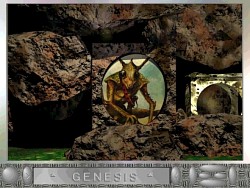
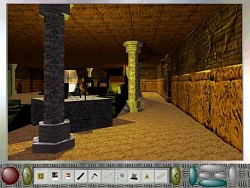
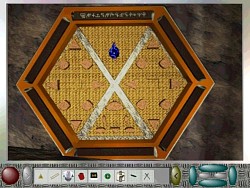
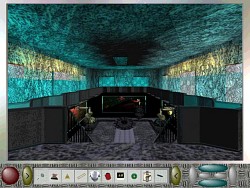
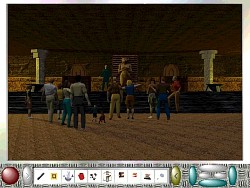
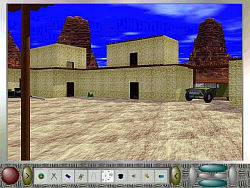
More
screenshots
|
